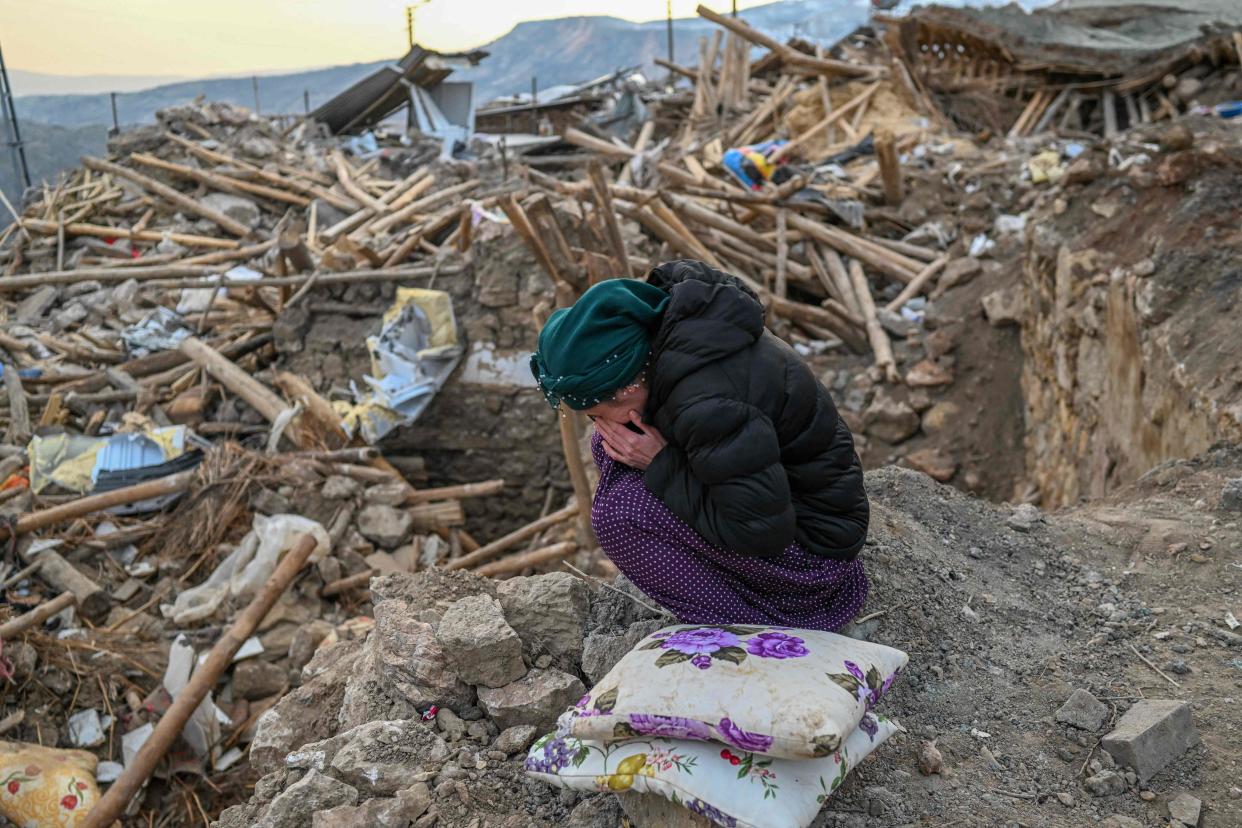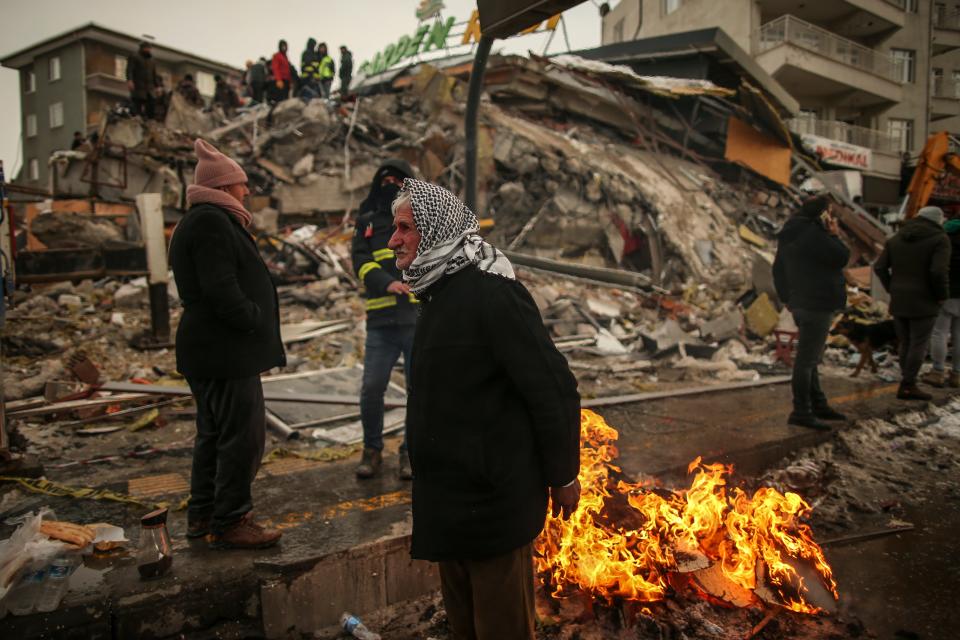'I can't reach Mom and Dad': Turkish family in Bloomington raises earthquake relief funds

Anatole Cakmak's phone started incessantly vibrating on the bedside table in his Bloomington home. An early riser, Cakmak was already asleep by 9:30 p.m., so his wife, Erica Vagedes, had to jar him awake and hand over the device.
On the line, he heard the voice of a shell-shocked sibling, calling from Turkey in the midst of a devastating earthquake in February that would contribute to the deaths of more than 47,000 people. It was a panicked phone call, with a quick rundown of what his family did and did not know at the moment. The message boiled down to simply: "I can't reach Mom and Dad."
Irsay Institute:Indianapolis Colts owners help open mental health institute at Indiana University
More than 5,000 miles away, near the southeastern border of Turkey, Cakmak's parents remained in their bed as the roof shook and trembled above them. The ground was shaking so hard it was impossible to stand, much less flee on foot to safety. With no other option, the elderly couple stayed in bed, waiting for either the shaking to stop or the building to cave in around them.
Later, the tremors subsided enough for the couple to finally rush out of the building. Still clad in their pajamas, they left without bringing a cellphone.
Coming down:Rubble, Kohr, parking garage all that remains of former Bloomington Hospital
It would be hours before Cakmak got confirmation that his parents were indeed alive and safe. But in the days that followed, he would come to understand just how devastating the earthquake's toll was, not just the fallen skyline of his old neighborhood, but on the lives of his close family, too.

Bloomington Turkish community members describe personal tragedies of 7.8 magnitude earthquake
Growing up in Turkey, Cakmak said he grew used to small tremors. It was par for the course for his area, which rests on the North Anatolian Fault, one of the most geologically active plates in the world. While earthquakes are quite common, there had never been, in Cakmak's memory, one comparable to what his old neighborhood experienced in late February.
In the southeast part of his home country, near the Syrian border, Turkish communities were devastated by a 7.8-magnitude earthquake. As recently reported in the New York Times, a magnitude-7 earthquake has been described by seismologists as having an energy equivalent to around 32 Hiroshima atomic bombs. Coupled with reported fatalities in the tens of thousands, the earthquake is now considered one of the deadliest of the decade across the globe.
The quake's epicenter was right where Cakmak grew up. While he and his wife typically return to Turkey every year to visit his family, nearly all of whom remained in the country, he hadn't been back to his old childhood home in 40 years — until last July, that is. In some cosmic coincidence, they'd decided to visit the area in addition to seeing his parents. In the end, it was the right decision, he said. All of it has since been flattened, reduced to rubble.
It's the images of crumbling buildings and desolate streets that make this nightmare really sink in for Vagedes.
In the early years of their marriage, she and Cakmak lived in that area of Turkey for a short time. What they saw in photos of the aftermath was shocking. The area near a stadium where she and Cakmak used to run every day, was now overflowing with relief tents. A thriving, bustling community had been toppled overnight.
"Turkey is the kind of place where everybody walks. Everybody's out and about," Vagedes said. "I think that's what is the most traumatizing for me is that thinking like all these places — where we've walked so many times and spent all this time — are destroyed. It's just hard."
While his parents and siblings were safe, many of Cakmak's close family members died as a result of the earthquake. Cakmak started to mourn family members who still hadn't yet been found, even as Turkish emergency crews were still pulling people — both living and dead — out from the wreckage in a multi-day rescue and search initiative.
His uncle was one of hundreds trapped underneath the rubble for several days. By the time Cakmak heard his uncle was, in fact, alive, he'd already begun mourning his passing. Though alive, the man was badly hurt, with at least one leg having to be amputated.
The emotional and physical toll was devastating.
For days, Cakmak felt that thousands-mile distance between himself and his family. While they were able to gather together and even pitch in to provide aid, Cakmak was here in Bloomington, entrenched in great grief and despair.
"There's nothing in the world worse than feeling helplessness, because you want to do something," Cakmak said. "So many people did something. They'd just start digging other people up. An entire country was just united and just trying to help anybody anytime, but we were so far away. We didn't know what to do."
Cakmak, who has lived in Bloomington since the late 1990s, is one of several Turkish people who have resettled in Bloomington. When he began talking with other locals, they felt that same urge to help. After holding an informal meeting with dozens of others, they decided on a plan of action.
New Bloomington nonprofit targets natural disaster relief
The Bloomington Turkish Community and IU Turkish Student Association have launched a local GoFundMe fundraiser to help raise money for relief aid to people impacted by the Turkish earthquake. The donations will be transferred to AHBAP, a well-known, transparent Turkish nonprofit organization that has been actively working to distribute earthquake relief.
So far, the fundraiser has raised $27,393 of its $50,000 goal from over 350 donations. But since donations through third-party vendors such as GoFundMe take a percentage, Cakmak and others are launching their own nonprofit, Anatole Relief Fund. This organization will cater to emergency aid relief for natural disasters both locally as well as some international causes such as the Turkish earthquake.
Find the GoFundMe page by searching Indiana Aid for Earthquake Relief in Turkey.
This article originally appeared on The Herald-Times: Bloomington family mourns loss, devastation in earthquake in Turkey

